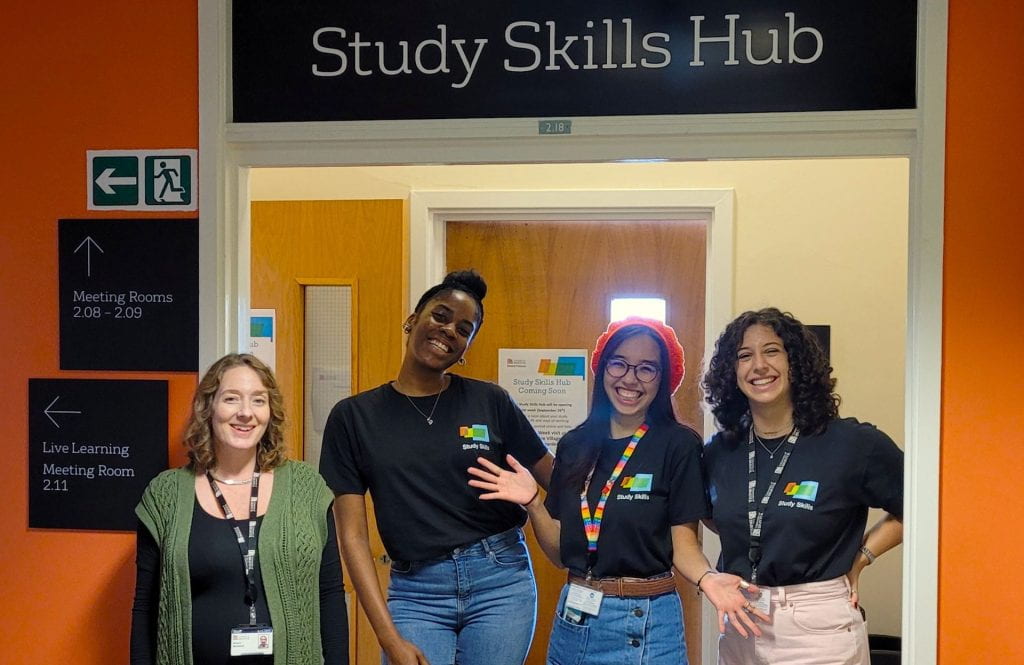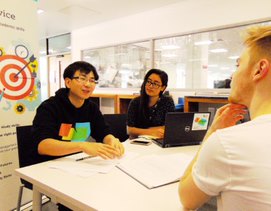
*Please note that the deadline for applications for the Student Advocate roles for the 2025/26 academic year has now passed.*
Be part of a dynamic team promoting and delivering Study Skills support in the 2025/26 academic year.
As a Study Skills Student Advocate you’ll be an ambassador for Study Skills, promoting the service to members of the University and public alike. You’ll also support fellow students by running Study Skills drop-ins and workshops, staffing pop-up stands, attending events and having input into online learning resources and more. You’ll develop skills in organisation, teaching, support, public speaking and team working, all of which will be valuable for your future career development.
We’re looking for applications from any student at the University of Bristol to join our Advocate team for the 2025/26 academic year, whether you’re undergraduate or postgraduate, home or international, as long as you’ll be a registered student in 2025/26. We’ll train you in all the skills you need and work with you throughout the year to ensure you develop and gain the best experience possible from working with us. We are also seeking students with skills in coding to assist at our weekly Coding Clubs.
Core duties of the Advocate Role:
- Act as an ambassador within your faculty to promote the Study Skills service.
- Deliver one-to-one peer support sessions to students for Study Skills. These may take the form of drop-in sessions at the Study Skills Hub in Senate House, or peer support in regular study groups.
- Facilitate workshops on Study Skills. Workshops may run face-to-face or online.
- Advocates with skills in coding may assist with our weekly Coding Clubs.
- Attend and assist in organizing promotional activities (such as pop up stands and lecture ‘shout-outs’).
- Assist in gathering feedback from students and academics in your faculty to help develop and shape Study Skills.
- Meet regularly with your Study Skills faculty tutor.
- Work collaboratively with Study Skills staff to help further develop the Study Skills service.
- Additional activities will be required as the role continues to develop.
Benefits of the role:
- This is a paid role (see wage details below).
- You will be provided with comprehensive training that will equip you with the knowledge and skills to carry out this role. Ongoing training will be provided throughout the duration of your contract as the role develops.
- Work experience to enhance your CV i.e. marketing, group-work delivery, time management, leading and influencing.
- An opportunity to shape the development of an ambitious, innovative university-wide project.
- The source of a reference for future employment / LinkedIn recommendations.
- This role can provide evidence that will contribute to the Bristol PLUS Award / Bristol PLUS Outstanding Award. (All team members are encouraged to participate in this award).
Wage:
Advocates are paid the Real Living Wage, which will be £12.60 per hour in September 2025. This role attracts a holiday increment of 12.07% per hour (so total paid per hour is £14.12). Workshop delivery (expected to start in the autumn after training) is paid at £16.76 per hour (plus 12.07% holiday pay). Wages are paid monthly in arrears via the Temporary Staffing Service (TSS).
Hours / Contract:
- Working hours will be discussed at interview, but will range from 0 – 6 hours per week (you will not be expected to work during University holidays or assessment periods)
- Training will begin in September 2025 and continue throughout the year. Contracts will begin in September 2025.
- Please note that to be eligible for this role you must be a registered student at the University of Bristol in the 2025/26 academic year.
How to apply:
Please apply with a CV and covering letter outlining your suitability for the role. You can find our advice on writing a cover letter here.
Submit your application to Dr Tim Worth (Study Skills Coordinator) at tim.worth@bristol.ac.uk by 11.59pm on Friday 07 March 2025.
Further information:
If you require clarification of the above information or have further questions about the role, please contact study-skills@bristol.ac.uk
Closing date: 11:59pm Friday 07 March 2025
Provisional interview dates: Monday 24 March – Friday 04 April 2025.



 by Emma Ford, Bristol Futures Advocate
by Emma Ford, Bristol Futures Advocate Anaya Price is from Trinidad and Tobago and is in her second year of undergraduate LLB Law. Anaya credits the pleasure of her course to her specifically chosen modules -namely Family Law, Medical Law and Crime Justice and Society- which she feels have real-life appeal and are expressed daily in our society. As a first-time advocate, she is excited to meet new people, help, and also learn from others.
Anaya Price is from Trinidad and Tobago and is in her second year of undergraduate LLB Law. Anaya credits the pleasure of her course to her specifically chosen modules -namely Family Law, Medical Law and Crime Justice and Society- which she feels have real-life appeal and are expressed daily in our society. As a first-time advocate, she is excited to meet new people, help, and also learn from others. Tala Youhana has joined the Student Advocate team this year and looks forward to being part of a friendly team and community of students, as well as engaging with the breadth of activities we have planned. As a second-year law student, Tala values the distinction between black-letter law and the open nature of its applications to society. Tala has already shown her enthusiasm via her involvement in writing articles and running workshops for the Study Skills team. A fun fact about Tara is that she has never won a game of Monopoly!
Tala Youhana has joined the Student Advocate team this year and looks forward to being part of a friendly team and community of students, as well as engaging with the breadth of activities we have planned. As a second-year law student, Tala values the distinction between black-letter law and the open nature of its applications to society. Tala has already shown her enthusiasm via her involvement in writing articles and running workshops for the Study Skills team. A fun fact about Tara is that she has never won a game of Monopoly! Aisling Mahony
Aisling Mahony Carol Huang
Carol Huang Martina Mattioli
Martina Mattioli Sabrina Choong
Sabrina Choong by Tala Youhana, Law student and Bristol Futures Advocate
by Tala Youhana, Law student and Bristol Futures Advocate